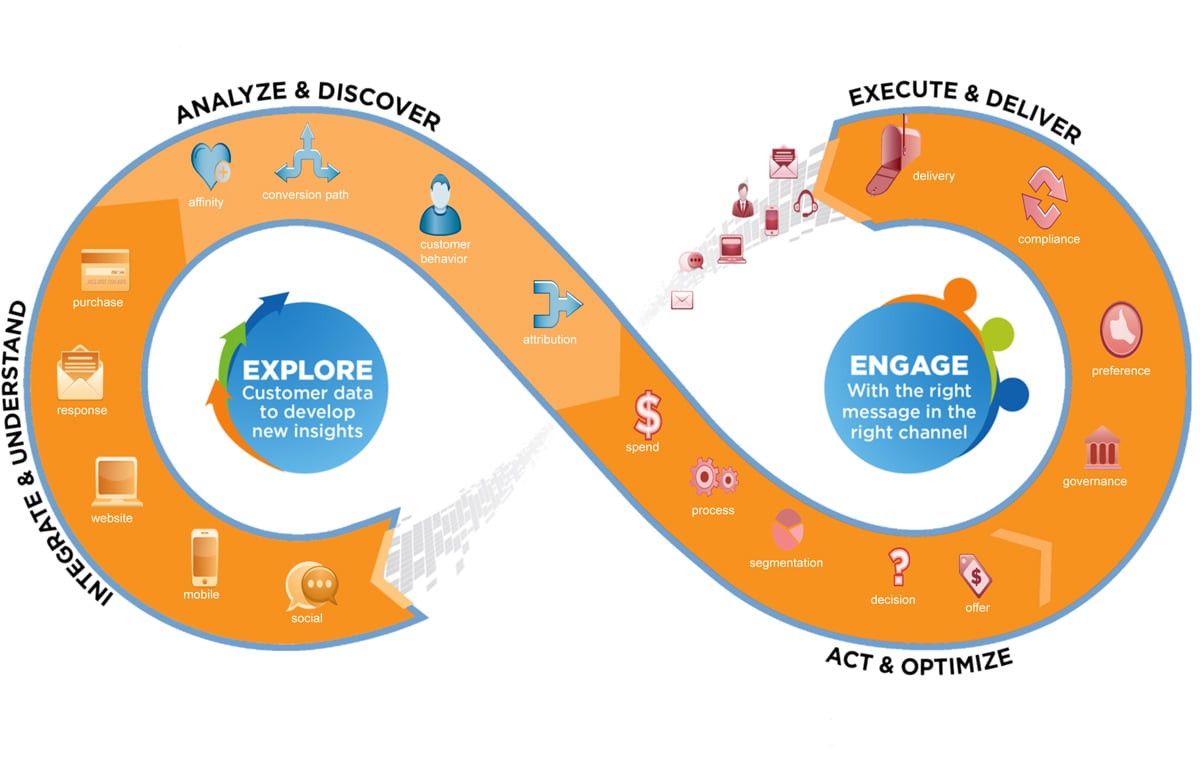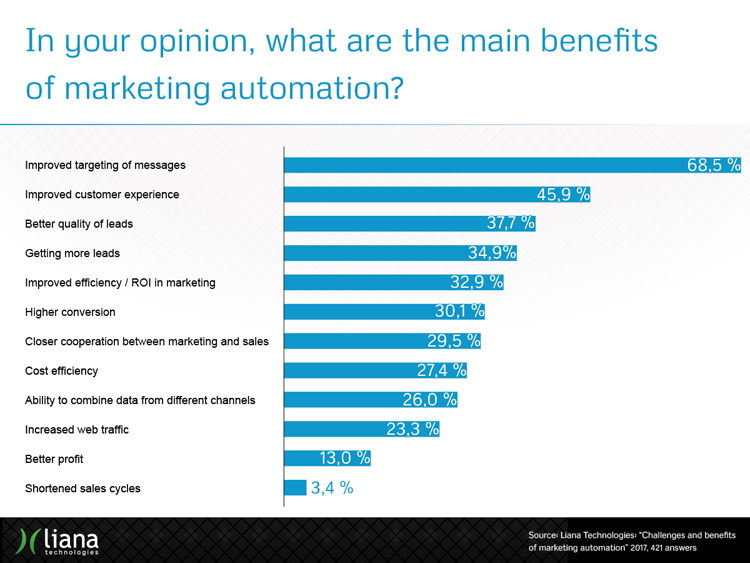Wie Sie eine datengesteuerte Marketing Automation-Strategie entwickeln
Sich auf sein Bauchgefühl zu verlassen, ist in der heutigen schnelllebigen digitalen Umgebung nicht der beste Ansatz. Clevere Vermarkter nutzen Big Data und fortschrittliche Automatisierungstechniken, um ihre Marketingstrategien voranzutreiben und personalisierte Inhalte, Kampagnen und Erlebnisse für ihre Kunden zu schaffen. Wie können Sie eine datengesteuerte Marketing Automation-Strategie für Ihr Unternehmen entwickeln? Lesen Sie weiter, um es herauszufinden.
Das Wichtigste in Kürze
-
Datengesteuertes Marketing wertet Kundendaten aus, um verwertbare Erkenntnisse über das Kundenverhalten zu gewinnen.
-
Unternehmen nutzen datengesteuertes Marketing, um personalisierte Produkte, Inhalte und Kampagnen in sozialen Medien und anderen Kanälen zu erstellen
-
Datengesteuertes Marketing verbessert die strategische Entscheidungsfindung und bietet einen Wettbewerbsvorteil
-
Um eine datengesteuerte Marketing Automation-Strategie zu entwickeln, sollten Sie klare Ziele festlegen, ein interdisziplinäres Team zusammenstellen und die richtigen Daten für die Nutzung bestimmen.
Was ist eine datengesteuerte Marketing Automation-Strategie?
Datengesteuertes Marketing ist der Prozess der Gewinnung verwertbarer Informationen aus großen Sammlungen von Kundendaten, die dann zur Entwicklung neuer Produkte, zur Positionierung bestehender Produkte, zur Erstellung gezielter Marketingkampagnen und zur Schaffung hochgradig personalisierter Kundenerlebnisse verwendet werden können. Eine datengesteuerte Marketing Automation-Strategie hilft Unternehmen, ihre Kunden besser zu verstehen und das Kundenverhalten vorherzusagen.
Vor der Einführung des datengesteuerten Marketings waren die Marketingbotschaften in der Regel von der Sorte "One-size-fits-all". Es gab einfach nicht genügend leicht verfügbare Informationen, um hochgradig maßgeschneiderte Produkte und Erlebnisse für Kunden zu schaffen. Durch die Nutzung von Big Data, die in der Regel über CRM-Plattformen gewonnen werden, können Unternehmen ihre Inhalte und Kampagnen jetzt hyperpersonalisieren und damit das Zeitalter der Personalisierung von Massenprodukten einläuten.

Warum datengesteuerte Marketing Automation wichtig ist
Die datengesteuerte Marketing Automation bietet eine Reihe wichtiger Vorteile für Unternehmen aller Art. Diese Vorteile reichen von der Möglichkeit eines präziseren Targetings von Marketingkampagnen bis hin zu unschätzbaren Einblicken in die Entwicklung neuer Produkte.

Ermöglicht personalisierte Kampagnen und Inhalte
Datengesteuertes Marketing automatisiert die Datenerfassung und -analyse und liefert detaillierte Einblicke nicht nur in die demografischen Daten der Kunden, sondern auch in ihre Bedürfnisse, ihr Verhalten und ihre Kaufgewohnheiten - all dies ermöglicht die Erstellung von hochgradig personalisierten Produkten, Marketingkampagnen und Inhalten. Sie verfügen jetzt über die Daten, die Sie benötigen, um die gewünschten Kunden zum gewünschten Zeitpunkt mit der relevantesten Botschaft zu erreichen.
Verbessert die strategische Entscheidungsfindung
Die detaillierten Einblicke, die datengesteuerte Marketing- und Marketinganalysetools ermöglichen, helfen Ihnen, bessere strategische Entscheidungen über Ihr Marketing, Ihre Produkte und Ihr gesamtes Unternehmen zu treffen. Wenn Sie Marketingdaten nutzen, um Ihre Kunden auf einer individuellen Ebene wirklich kennen und verstehen zu lernen, können Sie fundiertere Entscheidungen treffen. Sie können das Kundenverhalten besser vorhersagen und haben mehr Vertrauen in die Ergebnisse Ihrer Produkt- und Marketingbemühungen.
Informiert über die Entwicklung neuer Produkte
Datengestütztes Marketing kann wertvolle Metriken und Erkenntnisse darüber liefern, was Kunden wollen, brauchen und wahrscheinlich in Zukunft kaufen werden. Mit diesem Wissen können Ihre Marketingteams Produkte entwickeln, die diese Bedürfnisse besser erfüllen und mit höherer Wahrscheinlichkeit gekauft werden.
Bietet einen Wettbewerbsvorteil
Fast zwei Drittel (64%) der Führungskräfte sind der Meinung, dass datengestütztes Marketing einen erheblichen Wettbewerbsvorteil gegenüber Unternehmen bietet, die nicht über die gleiche Granularität der Kundendaten verfügen. Wenn Sie mehr über Ihre Kunden wissen als Ihre Konkurrenten, haben Sie einen Vorteil und können Ihre Website entsprechend optimieren und die Customer Journey verbessern.
Verbessert das Endergebnis
Schließlich, und das ist vielleicht das Wichtigste, erzielen Unternehmen, die datengesteuertes Marketing einsetzen, einen 5 bis 8 Mal höheren ROI als Unternehmen, die dies nicht tun. Das allein sollte ein Grund sein, an der Bewegung für datengesteuerte Marketing Automation teilzunehmen.
Wie Sie Ihre Marketing Automation Strategie auf Daten stützen können
Wenn Sie zu einer datengesteuerten Marketing Automation Strategie übergehen wollen, befolgen Sie diese sechs Schritte:
1. Setzen Sie klare Ziele
Sie müssen klare Ziele dafür entwickeln, was Sie mit einer datengesteuerten Marketing Automation-Strategie erreichen wollen. Zu diesen Zielen können die Verringerung der Kundenabwanderung, die Entwicklung von mehr und qualitativ hochwertigeren Leads, die Bereitstellung eines hervorragenden Kundenerlebnisses und die Verbesserung des Customer Engagements gehören. Durch die Definition dieser Ziele erhalten Sie Anhaltspunkte, um den Erfolg Ihrer neuen Strategie zu messen.
2. Stellen Sie das richtige disziplinübergreifende Team zusammen
Wenn es um die Entwicklung einer Marketing Automation-Strategie geht, müssen Sie die richtigen Leute an Bord haben. Sie müssen ein Team zusammenstellen, das die richtige Mischung aus IT-, Datenmanagement-, Vertriebs-, Marktforschungs- und traditionellen Marketingkenntnissen aufweist. Das bedeutet, dass Sie Talente aus verschiedenen Abteilungen und Disziplinen rekrutieren und diese Personen dann mit den entsprechenden Mitarbeitern im gesamten Unternehmen zusammenbringen müssen.
3. Verwenden Sie die richtigen Daten
Das alte Sprichwort "Garbage in, garbage out" (Müll rein, Müll raus) gilt natürlich auch für datengesteuertes Marketing. Um die besten Entscheidungen treffen zu können, müssen Sie auf die richtigen Daten zugreifen. Gehen Sie über die grundlegenden demografischen Informationen hinaus und konzentrieren Sie sich auf die Daten, mit denen Sie Ihre Marketing- und Vertriebsaktivitäten am besten personalisieren können - und stellen Sie sicher, dass Sie die aktuellsten Datensätze verwenden. In der heutigen schnelllebigen Zeit können Sie Ihre Entscheidungen nicht auf Kundendaten stützen, die mehr als ein oder zwei Jahre alt sind.
4. Nutzen Sie Marketing Automation Tools zur Datenanalyse
Je mehr Daten Sie zusammentragen, desto wichtiger ist es, dass Sie die Technik der Marketing Automation einsetzen. Um die besten Ergebnisse zu erzielen, benötigen Sie eine Reihe von Marketing Automation Tools, die große Datenmengen nahezu in Echtzeit analysieren können.
5. Nutzen Sie die Automatisierung zur Verbesserung des Kundenerlebnisses
Nutzen Sie diese Datenanalyse, um ein personalisiertes Kundenerlebnis zu bieten. Je besser Sie Ihre Kunden kennen, desto besser verstehen Sie, was sie in Bezug auf Produkte, Einkaufserlebnisse und Angebote wünschen. Um die besten Ergebnisse zu erzielen, stimmen Sie das Einkaufserlebnis auf jeden einzelnen Kunden ab.
6. Messen Sie die richtigen Ergebnisse
Wie messen Sie den Erfolg Ihrer datengesteuerten Marketingstrategie? Gehen Sie zurück zu den Zielen, die Sie in Schritt eins festgelegt haben, und ermitteln Sie, wie gut Sie das erreicht haben, was Sie sich vorgenommen haben. Das kann bedeuten, dass Sie Customer Engagement, Leadgenerierung, Conversions und Anzeigenklicks sowie den ROI insgesamt messen. Messen Sie genau und messen Sie häufig, um Ihren Erfolg zu ermitteln.
Lassen Sie sich von Optimizely bei der Entwicklung einer datengesteuerten Marketing Automation-Strategie helfen.
Wenn Sie eine datengesteuerte Marketing Automation in Ihrem Unternehmen einführen möchten, wenden Sie sich an Optimizely. Unsere Personalisierungsplattform nutzt fortschrittliche KI-Technik, um Nutzerdaten zu analysieren und hochgradig personalisierte Inhalte, Produkte, Kampagnen und Websites zu erstellen. Lassen Sie Optimizely Ihrem Unternehmen helfen, datengesteuertes Marketing einzuführen - und Ihr Unternehmen für die Zukunft zu stärken.
- Zuletzt geändert: 30.04.2025 00:31:09